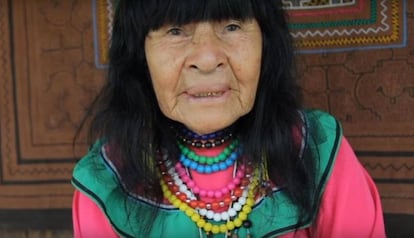Death in the Amazon rainforest: a shaman is shot, and a Canadian gets lynched
Video emerges in Peru of locals killing Sebastian Woodroffe, suspected of murdering indigenous leader Olivia Arévalo

Olivia Arévalo Lomas, an indigenous healer with the Shipibo Konibo tribe of Peru, was shot twice on Thursday of last week and died near her home in the village of Victoria Gracia, in the central Amazon region of Ucayali.
Two days later, a video began to circulate of locals lynching a Canadian man, Sebastian Woodroffe, who was believed to be a patient of the shaman, and living in the area.
He asked her to sing and then he killed her, said the locals
The day after the murder, Deputy Minister of Intercultural Affairs Elena Burga had already accused Sebastian Woodroffe. “We know he committed the crime but the police are doing their job and the authorities are investigating,” she said. Just hours after this statement, locals took the matter into their own hands.
The video shows the Canadian man being beaten and then dragged along the ground with a rope around his neck. A dozen people observe the scene, including a handful of children.
Shipibo journalist Cecilio Soria told EL PAÍS that around 200 police officers had arrived in the community on Saturday to dig up the Canadian’s body, which was buried in a shallow grave 500 meters from where he was lynched. According to Soria, the police were keen to make arrests, but Burga asked that they wait until after the healer’s funeral – which took place on Sunday – before stepping in.
According to the indigenous news site Servindi, a reward poster with Woodroffe’s photo was distributed by Arévalo’s family the day after her death. “This is the man who killed the teacher Olivia Arévalo after making her sing an ícaro [medicine song]. He found her alone, he asked her to sing and then he killed her,” it said. Rumor had it that after killing Arévelo, Woodroffe escaped on a motorbike.
Sebastian Woodroffe had raised more than $2,000 on the crowd-funding platform Indiegogo to go to Peru and learn about medicinal plants to help others fight addiction. “Conventional detox centers have a 5% to 8% success rate. Unacceptable,” he wrote on the site. The National Police have yet to find a motive for the healer’s murder.
Attacks on indigenous communities need to be more closely followed up, said authorities
As a source of traditional knowledge, Arévalo’s loss has been keenly felt in the community. The ícaros she sang are often performed during healing ceremonies at which ayahuasca, a hallucinogenic plant brew, is drunk. After the murder, a video of Arévelo singing an ícaro was posted on social media.
The Ombudsman’s Office condemned both the murder of Arévalo and the subsequent revenge killing. “Attacks on indigenous communities need to be more closely followed up, given their location in more isolated parts of the country,” said a spokesman while also affirming “absolute condemnation of the lynching and murder of the suspect.”
According to Elena Burga, “the Culture Ministry is trying to establish whether this was a personal matter or an assault on indigenous leaders in general.” Just hours after Arévalo was killed, another member of the Shipibo community was threatened in a message left in her garden beside two bullets, one for her and the other for her husband. The message warned them to leave their home in the Nueva Era in the Yarinacocha district.
In December 2016, indigenous Amazonian healer Rosa Andrade, 67, was murdered by someone outside the community, a crime that remains unresolved, like the killing of environmental advocate Edwin Chota in 2014 and others like him, committed in areas where conflict rages over land disputes and illegal logging.
English version by Heather Galloway.
Tu suscripción se está usando en otro dispositivo
¿Quieres añadir otro usuario a tu suscripción?
Si continúas leyendo en este dispositivo, no se podrá leer en el otro.
FlechaTu suscripción se está usando en otro dispositivo y solo puedes acceder a EL PAÍS desde un dispositivo a la vez.
Si quieres compartir tu cuenta, cambia tu suscripción a la modalidad Premium, así podrás añadir otro usuario. Cada uno accederá con su propia cuenta de email, lo que os permitirá personalizar vuestra experiencia en EL PAÍS.
¿Tienes una suscripción de empresa? Accede aquí para contratar más cuentas.
En el caso de no saber quién está usando tu cuenta, te recomendamos cambiar tu contraseña aquí.
Si decides continuar compartiendo tu cuenta, este mensaje se mostrará en tu dispositivo y en el de la otra persona que está usando tu cuenta de forma indefinida, afectando a tu experiencia de lectura. Puedes consultar aquí los términos y condiciones de la suscripción digital.








































